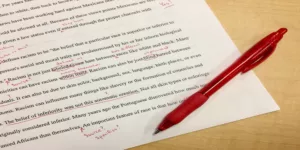As I sat in my college dorm room, editing my college research paper on cloning and stem cell research, it occurred to me that I might as well take the time to share my opinions, strategies, tips and ideas for editing a research paper. Despite rising test scores, many college students, graduate students and high school students have a difficult time editing a research paper that is often long, tedious in language, and often extremely boring. However, I share my tips and strategies which I hope you will find helpful the next time you are writing your paper for school.
The first step in editing a research paper is to first take a break once you finish writing a paper. Do not dive head first into editing a paper the moment that you finish writing the paper. Give yourself if you can manage, a few hours of time passed by before you start to edit your paper. Ideally, you should edit the paper the next day and put the paper out of your mind until the next day. Why do you need the break in time before you edit your paper? The reason is because you want to edit the paper with a clear mind; in fact, many successful people have stated that having a clear mind is vital to working efficiently.. Often when you are in the process of writing your paper you get caught up in what you wrote and some people think that what they just wrote is the best paper ever written when often is the case that the paper written is full of spelling and grammar errors.
Once the period of time has passed, go slowly over your paper. Start with page one and go line by line, reading it out-loud to yourself often helps, and edit each and every sentence. This is a long process but I guarantee that if it is done correctly, your paper will sound a lot better. Make sure that when you read the sentence it sounds good. You should not have to stumble when reading the sentence because each sentence should flow smoothly. If it doesn’t, then edit it to make it sounds better. Remember, your teacher, professor, or committee will also be reading this paper and if they don’t like the way a sentence sounds, then they will take off points for it. Also, re-read each sentence to make sure that each word is spelled correctly. Some words such as “their, they’re, and there” you might mix up. Some words are not picked up as incorrect by a spell check or grammar check on a word computer document such as “loose” and “lose”, both of which are spelled correctly and could be correct in the right context, depending on the sentence which is why it is your job to correct the sentence if it has an error.
As you read each sentence, question everything that is written on the page. If you feel that a sentence or paragraph is ambiguous, then add a sentence or change it so that it isn’t ambiguous and you are identifying the noun and subject in the sentence. Some sentences require more information to be provided to help the reader understand the point that you are trying to convey to him or her. Make sure that your punctuation is correct with periods and commas. Many people don’t use commas correctly and a good tip is to say the sentence out-loud to see if the sentence needs a comma or not.
Another great strategy for editing is to use a thesaurus. As you scan through your paper, if you feel that you keep repeating the same word or phrase, look up the word in the thesaurus and chose and different word or phrase. This will make your paragraph and sentence sound much better.
When you are editing a paper set aside a block of time to write the assignment. When you are done editing each and every sentence in your paper, go back and look at the instructions from the class about the paper. Make sure that you address all parts of the topic. Also make sure that if the paper requires page numbers, you insert them. Most research papers require a bibliography. Make sure that you put the author’s last name for each citation in alphabetic order and nothing is spelled wrong on the citation page. Also include citations or footnotes if they are needed. Editing should be done more than once. There are differences in format, so make sure that you know the differences.
Also have your friends take a look at your paper if possible. Every person has a different opinion on writing and they may make suggestions. Tell your friends to make all of the suggestions and comments that they want on a copy of your paper. Then it is up to your discretion whether you feel that these changes would improve the paper.
Hopefully these tips on editing a research paper will help you. Good luck and happy writing!








